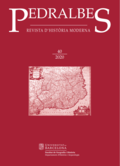Mediterranean horse cultures: Greek, Roman and Arabic equine texts in late medieval and early modern Andalusia.
DOI:
https://doi.org/10.1344/PEDRALBES.40.4Keywords:
Iberia, Mediterranean, cavalry, veterinary medicine, horsesAbstract
In histories of medieval and early modern Iberia, distinctions between ‘Christian’ and ‘Muslim’ cavalries have become shorthand for differing forms of social organization and cultural meaning embedded in the relationship between horse and rider. In other words, practices with horses—as amalgamations of style, technique, and function—also imply region, religion, and eth- nicity, in effect, transforming the signified (the equestrian tradition) into the signifier (a marker of boundaries and identities). However, the religious boundaries implied by the use of Iberian Muslim horse culture are rapidly undermined by examination of the recurrent circulation of equines, equestrian experts, and equine-related texts in a circum-Mediterranean context. Reframing Iberian horse cultures within broader Mediterranean connectivities illuminates a common body of equine knowledge uneasily contained by regional, imperial, or ethnic-religious denominations, and emphasizes the dynamic multi-functionality of horses, riders, and texts about horses. By focusing on the particular practices constituting cavalry traditions, rather than the cultural identities their labels imply, the notion of Mediterranean horse cultures can better aid historians in deciphering outcomes of diplomacy and military strategy across Christian-Muslim borders.
Downloads
Published
How to Cite
Issue
Section
License
Copyright (c) 2020 Kathryn Renton

This work is licensed under a Creative Commons Attribution-ShareAlike 4.0 International License.
Authors must agree with the following terms:
1. The author keeps authorship rights, ceding the journal the right to first publication.
2. Texts will be disseminated with a Creative Commons Attribution 4.0 International License. Which allows for the work to be shared with third parties, as long as they recognise the work’s authorship, the original publication in the journal and licensing conditions.
This requires acknowledging authorship appropriately, providing a link to the license, and indicating if any changes have been made. It can be indicated in any reasonable way, but not in a manner that suggests the licensor endorses or sponsors the use of the text.
If content is remixed, transformed, or new content is created from the journal's texts, it must be distributed under the same license as the original text



